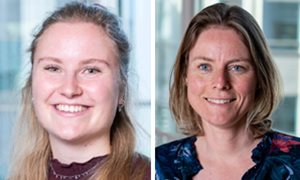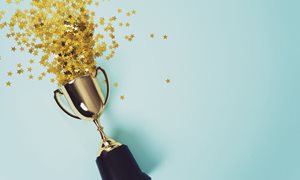 My name is Anke van Erp, Dutch, PhD candidate at the Dept. of Medical Oncology, theme Rare cancers.
My name is Anke van Erp, Dutch, PhD candidate at the Dept. of Medical Oncology, theme Rare cancers.
When you were a kid what did you want to be when you grew up? Can you tell us something about your child years.
When I was a kid, I first wanted to be dolphin trainer (after a trip to the Dolfinarium in Harderwijk) or a veterinarian. However, I quickly realized that being a dolphin trainer might not be as glamorous as it seemed to be in the Dolfinarium and when I realized that a veterinarian also treated cows, horses and other large animals my interests were quickly cooled. I grew up as the youngest of 4 children in a town called Deurne in North-Brabant. I went to primary and high school in Deurne and I still have a group of friends that I met during this time.
What was your previous academic training, where did you study and why that study?
I studied Biomedical Sciences at the Radboudumc. Both my Bachelor and Master degree I obtained in Nijmegen, I performed my internships at the department of Experimental Rheumatology (RIMLS), the department of internal medicine (Radboudumc), and my final internship I performed at the Karolinska Institute in Sweden.
When I look back I have always had a special interest in the human body, especially the way it works. One of my most beloved television programs was a show on the Belgian TV “Er was eens…het Leven” (“Once upon a time…Life”), which showed you how our body works in a child-friendly way and during the last years of high school I knew I wanted to do something with human biology, only I didn’t want to be a physician. This ultimately led me to Biomedical Sciences. The perfect choice for me.
The RIMLS motto is: ‘Today’s molecules for tomorrow’s medicine’. What does this mean for you?
The meaning of this motto to me is that knowing how things work, not just that they work, is just as important as the ultimately clinical impact of a medication. Discoveries of today could lead to a breakthrough in 10-15 years when it comes to treatment (or even faster). However, we should never forget our ultimate goal. Ultimately, even if it takes a long time to get there, we want to make tomorrow’s medicine in order to increase efficacy of treatment or even development completely new treatments.
Who is your great example as scientists? And please give a motivation why.
I don’t have a scientist that is a great example to me. There have been multiple discoveries over time that have changed the world of medicine, without these discoveries we would not be where we are today so they all deserve a place of honour.
Which research discovery that you have made has made you most proud?
I don’t have one research discovery that jumps out at me, but I guess what makes me proud is the fact that I worked on many different projects during my PhD, all in an attempt to find a new treatment option for young patients with sarcoma. Even when one of our ideas did not work as well as we had hoped, we always found new projects to start and always with just as much hope in finding a new treatment option.
Given unlimited finance what experiment would you perform?
Given unlimited financing I would like to do multiple things: first of I would like to try and improve international collaboration when it comes to sharing (sarcoma) models and research data for/from preclinical research, maybe create some kind of database showing which models are available around the world and very importantly try and incorporate the data that has been performed using these models in order to reduce repetition of both successful and unsuccessful ideas. Second, the sarcoma subtypes that I work with are nearly all characterized by a genetic translocation leading to a fusion protein. Up till now there are no treatments that can target these specific oncogenic drivers, I would like to see whether with new technologies (nanomedicine perhaps) we might be able to target them after all and see whether they could have clinical potential.
What does your working area (desk, office) look like and what does it say about you (or your research)?
My desk is covered with folders full of handwritten paper, papers, my (very large) coffee mug and food, and is surrounded by posters showing signalling pathways. I guess what it says about be that I can find order in chaos and that I am a very visually-based person. In order to remember and understand things (such as pathways) I need to see them in front of me. Words don’t work as well as an image.
Nominate a colleague to be in the spotlight and what would you like to ask him or her?
Marije Weidema. What do you prefer, being a preclinical researcher or being a physician?
What type of person are you, quick insights:
a) Mac or PC? : Mac (no competition)b) Theater or cinema? : Cinema
c) Dine out or dine in? : Dine out
d) Ferrari or Fiat? : Fiat
e) Shopaholic or chocoholic? : If I have to chose: Shopaholic, if not: neither
f) Culture or Nature : Both
Related news items

Combining targeted radionuclide therapy and immune checkpoint inhibition for cancer treatment
4 May 2022 Simone Kleinendorst, Sandra Heskamp and colleagues, theme Rare cancers, published in Clinical Cancer Research about their research on combined radionuclide therapy and immunotherapy for cancer treatment. go to page
New method improves diagnostics of lymphoma
10 December 2021 Blanca Scheijen and Patricia Groenen of the Department of Pathology, together with a European consortium, developed a diagnostic method that more clearly distinguishes between inflammation and lymphoma in enlarged lymph nodes. go to page
Million Euros to develop therapy against cancer metastasis in bones
22 November 2021 In the PlatiBone project, researchers Sander Leeuwenburgh and Sandra Heskamp will test new drugs that combine diagnostics, chemotherapy and radiation go to page
RIMLS awards call for nominations
19 October 2021 RIMLS awards several prizes to stimulate and honor our (young) researchers. Upcoming awards are Supervisor of the Year, Best Master Thesis, Best Publication, Best Image and more. Send your nominations now before 24 November 2021. go to page
Tackling cancer with radioactive particles
2 September 2021 Professor Sandra Heskamp receives grant for research into cancer treatment with radioactivity go to page
